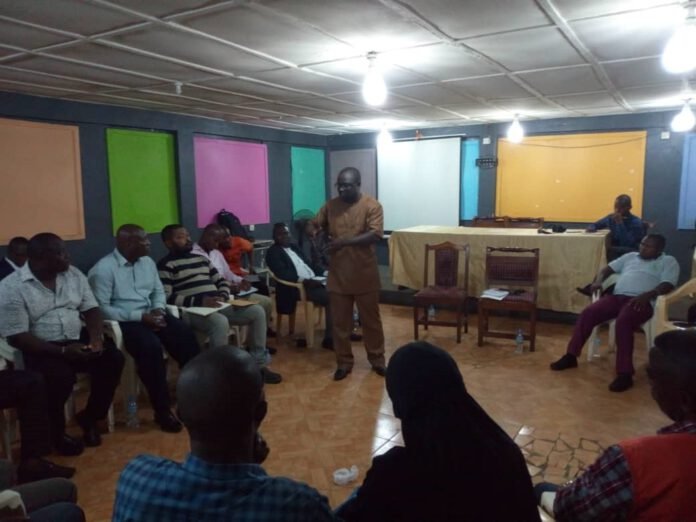The Media Reform Coordinating Group Sierra Leone and its constituent bodies (Guild of Editors (GOE), Women in the Media (WIMSAL), Independent Radio Network (IRN), and the Sierra Leone Association of Journalists (SLAJ)) have commenced the 2019 Peer Review session for newspaper editors and radio station managers on understanding the enforcement of ethical provisions of the Independent Media Commission (IMC) Act and Code on Monday August 26, 2019 at SLAJ Secretariat in Freetown.
MRCG Project Officer, James Harvey noted that the Peer Review session is essential as it discusses matters relating to ethical issues and the relationship between the media and media regulators particularly the Independent Media Commission. He reiterated that the MRCG is there to ensure that the media in Sierra Leone speak with one voice than in a fragmented way.
SLAJ Representative to the IMC Board, Dr. Commissioner Francis Sowa explained the different provisions of the IMC Act and Code specifically pointing out areas that journalists fall short of. He spoke about the need for a cordial relationship between the IMC and media practitioners.
The President of SLAJ, Ahmed Nasralla stated that the Peer Review is essential for media development in Sierra Leone. “It is good to be having such programmes periodically to review the work of the media,” he said.
SLAJ President further encouraged journalists to be responsible and professional by respecting the laws and channeling their concerns through bodies concerned for healthy resolution. He called on journalists to critique fairly and genuinely and not to take sides in their reportage.
Mr Theo Harding, Chairman Guild of Editors thanked MRCG and expressed his appreciation for the Peer Review session especially on the impact it creates on editors and journalists. He called for such programs to be held periodically for the benefits of journalists.
Madam Tiana Alpha, President of WIMSAL and the Western Area IRN Coordinator applauded the Peer Review session stating that it is a step in the right direction. She encouraged journalists to complement the work of IMC by being professional and responsible in their reportage and complying with the IMC Code and other media related laws.
Media participants raised concerns over NATCOM’s intention of changing the status of community radio stations to commercial radio in December. Regarding media frequency distribution, participants called for the introduction of a National Frequency Allocation Policy which they believe will solve the issues of frequency allocation in the country.
This project is funded and supported by the National Endowment for Democracy (NED)




































